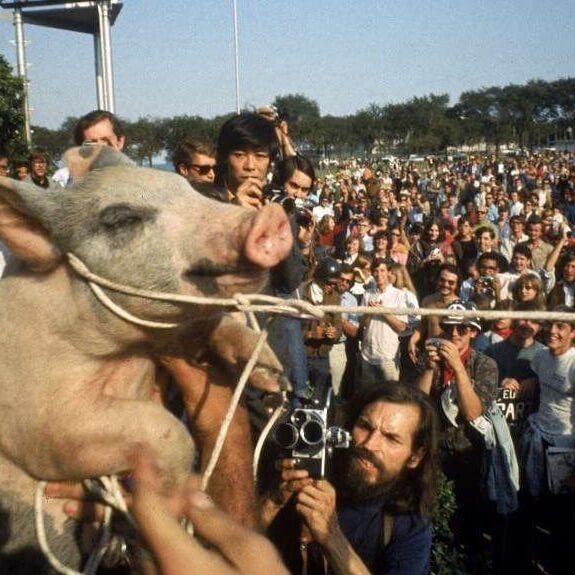



CELEBRATING THE MARCH & LEVITATION OF THE PENTAGON
Washington D.C., Oct. 20 & 21, 2017
by Judy Gumbo
All of us who were around back in my day of rebel activism has their own 1960s. This is especially true for the American War in Vietnam. Each of us has a distinct viewpoint; powered most often by the anti-war passion we all felt.
I had never been up close to the actual Pentagon when I arrived there this Oct. 20, 2017 for a vigil that preceded a conference on the 50th anniversary of the Oct. 1967 March on the Pentagon. I was less intimidated seeing the Pentagon than I expected, given the stories from 1967 I had heard — perhaps also because the sun was out and most of the photos I had seen are dark. Then came Peter Yarrow: 79-years-old, aging, silver-haired like the rest of us, Yarrow moved me to tears with his renditions of "Where Have All the Flowers Gone?" and "Blowin' in the Wind."
I and my guess is most of the audience were moved to tears, too. Yarrow finished. I decided it was time to re-enact the Yippie Levitation of the Pentagon. Full disclosure: I wasn't in the USA in October 1967, I was still in Canada making my way out of a dysfunctional starter marriage. But Stew Albert, Nancy Kurshan, Anita Hoffman, Jerry Rubin, Abbie Hoffman, Tuli Kulpferberg and Alan Ginsberg all were.
"The opposing armies for the new war looked like polar opposites," Stew wrote. "Soldiers for the empire had crew cuts, were disciplined, obeyed orders. — they were regimented in all ways. Ours was a ragtag, carnivalesque conglomeration of shabby bright clothing, wild hair, sloppy posture & chaotic order. But we were all around the same age, growing up in the same country watching the same television programs and dreaming the same fantasies. Surface dissimilarities aside, we were all children of America on our way to becoming its orphans."
Abbie, who not surprisingly sounds a lot more stoned than Stew, chanted:
Pocket Full of Pot
Four and twenty generals
All begin to rot
All the evil spirits
Start to tumble out
Now the war is over
We all begin to shout — Join us, Join Us
In her unpublished memoir, Nancy calls the Pentagon a baroque symbol of evil and oppression. Group of Holy men (not women) would raise Pentagon 100 feet in the air. The Yippies did apply for a permit to exorcise the Pentagon, mainstream media reported that the government said ok but no more than three feet. Three feet may be a false fact but that's the number I always heard. Knowing this, and thanks to my longtime friend Frank Joyce, I took the mic, asked the crowd of 50 plus people to raise their hands in the air. Like a civil war re-enactment, the audience joined me in chanting just as the demonstrators had in 1967: "Out Demons Out! Out Demons Out!" It was not clear to me if the Pentagon actually levitated in 2017 either, but who is to say it did not? Certainly not me.
We activists have a kata for our vigils and conferences: speeches followed by speeches, followed by speeches, followed by speeches. Followed by more speeches. Here are some highlights:
+ Ton-Nu-Thi-NInh, former Vietnamese diplomat & National Assembly member who reminded me of a younger Mme. Binh , was unhappy with the PBS series since they omitted what she called the "original sin" that American invasion was in violation of international peace agreements -and for their scapegoating and dehumanizing of Vietnamese leader Le Duan, an architect of Vietnam's success in winning the war.
+ Le An Tu Packard, an anti-war activist and researcher, who brought home the point that the PBS documentary was not Hanoi's War, it was the American war.
+ Meeting Tiana Alexandra-Silliphant, an Americanized Vietnamese, a recent widow who describes herself as an indie non-fiction filmmaker and was one of those balls of fire you can't help but adore.
+ Hearing Susan Schnall, a former Navy nurse now working to expose atrocities inflicted on Vietnam as a result of Agent Orange and other deadly defoliants. And Susan Hammond, who I first met in Vietnam in 2013, who educates about Vietnam's legacy of unexploded ordinance. Both Susans showed slides of severely disabled children, just like the children I met at Friendship Village outside Hanoi, who are still victimized by the remnants of the American war in Vietnam
+ Learning that, statistically, while 2 million Americans went to war, 6 million protested
The best panel, in my opinion, was on "Unlearned Lessons" about the Burns and Novick PBS series. I agree with Bill Zimmerman, a long-time friend of Tom Hayden's, who said the series was simplistic, with serious sins of omission, by which he meant specifically the anti-war movement. At the same time, Bill found the series positive about Ho Chi Minh and correctly negative about lying presidents. But I learned something after Bill excoriated Mayday as a tactical and strategic failure. I was a Mayday organizer. Our slogan was "If the government won't stop the war we'll stop the government." We blocked traffic using the tactic of passive non-violent civil disobedience. It was wrong, Bill claimed, to ask mainstream activists to risk arrest; to do so would frighten off people who were not prepared to go that far. With 14,000 arrests, Mayday would become the largest mass arrest in U.S. history.
Bill may have been either right or wrong about the mainstream but others in the anti-war movement also criticized Mayday for being too militant. What Bill failed to mention, and perhaps he doesn't know, is that the much more militant Weather Underground had alerted Mayday organizer Rennie Davis that, in the run-up to Mayday, they planned to place a bomb in a bathroom in the Capital Building, a David vs Goliath act against a never-ending war. Rennie, or so I heard, criticized the WUO plans. He worried it would turn the anti-war movement against Mayday. Rennie requested the WUO desist. Which they did not.
This looks to me like a trajectory: from less extreme acts to more, each group believing theirs was the most moral and most effective way to help stop the war — each group unhappy with the next level of escalation. In my opinion, all were necessary. The anti-war movement did not end the American war in Vietnam, the NLF and NVA did that. But all of us who resisted, each in our own way, made the difference.
Another lesson from Bill: Ken Burns interviewed a few anti-war activists, including Bill, for hours. Bill got very little screen time, Nancy Biberman had all her comments edited out so that the only substantial statement of hers the filmmakers used was an apology they took out of context. It was not her main point. Burns had his own agenda; he claimed neutrality but edited his film to promote a point of view which denigrated and omitted the anti-war movement. I say be warned: Those of us who get interviewed by the media must be VERY CAREFUL what words we chose. We must find out as much as possible beforehand what the interviewer is trying to accomplish. And for those who watch it: remember, words can be taken out of context. Which in my mind leaves this burning question: is it better to say something, even if it's wrongly used, or refuse to participate and by so doing ensure we are left out?
Military resistance through fragging and sabotage was far greater than I knew. Fragging went from acts of disobedience, to smoke grenades thrown as a warning, to actual maiming and killing by their own troops of 80-90 gung-ho top sergeants and lieutenants and captains. As the American side of the ground war wound down, military resistance became centered in the Navy, involving upwards of 1000 sailors in an organization called Stop Our Ship (SOS); a seaman sabotaged the engine of the USS Ranger delaying its deployment for four months; there were two dozen additional minor sabotages; a mutiny occurred on the USS Constellation in 1972 involving upwards of 250 sailors, mostly black; in July 1972, a sabotage-fire on board USS Forrestal delayed her deployment for three months. Active violent resistance in the military did far more damage and was far more effective in impeding the war effort than any bombings or sabotage the Weather Underground or homegrown groups ever did.
The popular memory of these acts of resistance has been replaced by the alleged spitting on returning vets or yelling "baby-killers" by anti-war protesters. One speaker claimed James Reston had published this in the New York Times. The story then became a false fact which may have prompted others to take action. No one at the conference, no one I know, had ever spat or seen a spitting. Or yelled 'baby killer' at returning GI's. "But they were baby-killers," one conference participant said.
My friend Frank Joyce put it this way: To challenge the military as we did by marching on the Pentagon is to challenge not just a center of power but also the two core values that are at the heart of the US belief system. The first of those is hypocrisy. The second is that "freedom" is inextricably associated with violence. No meme is more powerful or more common than: they died to make us free. Which means of course that they killed to make us free. And they must keep on killing.
MY CAVEAT ABOUT THE CONFERENCE: It was run by sincere, dedicated, and very serious older white men. if you are going to celebrate a 50th anniversary of a movement that was mostly white and unquestionably male-dominated, it should be no surprise that men will predominate. The optics were lousy at this conference: white men made up the majority on all panels; there was only one Black man who spoke and only in a truncated segment I was part of; the tactics used to get off stage anyone in this segment who went over time felt heavy-handed, especially when others in that same segment who had a political viewpoint possibly more compatible with the organizers were permitted to run over. At the same time, much of what these latter folks had to say was both informative and moving. What to do next time if/when there is a next time? I suggest greater transparency with less hierarchical organization and communication, but since I won't volunteer be an organizer, is it fair for me to gripe but take no action? Sadly, the gender/race dynamics at the 50th Anniversary of the March on the Pentagon appeared to mirror with exactitude many mainstream Movement meetings I attended in 1968—as if nothing at all had changed. Except it has.
Even with this caveat, I am extremely glad I took part. The 50th Anniversary of the March on the Pentagon attempted to provide a big anti-war tent to honor an important event. It succeeded.
You can find much more on the website www.vietnampeace.org.
This article also appears at Counterpunch.



